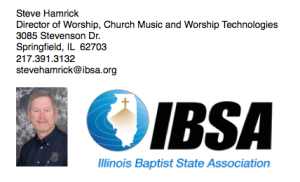Worship Interruptions
The following story did not happen on one particular day but is a compilation of things that have happened to me over several years.
You arrived at Sunday morning rehearsal and noticed no one was in the sound and video console. The band and vocals were ready. It’s time for a sound check. The sound and video system was not turned on so you had to go up to the production booth and turn on everything. It’s a good thing you proofed the video already because there is no one to run it during rehearsal. You are glad you made written copies of the music for the singers because the rear screen was unavailable.
Midway through the rehearsal, the sound operator showed up still half asleep and the video person didn’t arrive until a few minutes before the service. Your stress level was through the roof. You tried to prepare yourself for the corporate worship experience (good luck) but nothing was going right. If there was only a better way to get organized and find faithful help.
At the beginning of the service the sound man forgot to turn on your mic. You waved and tapped on the mic (don’t do that) three or four times to get his attention. He pushed the mute button and the untested mic was overdriven and squealed. When singing, the praise team and choir could not hear the monitor so they don’t stay together. The house sound was too loud.
During the congregational singing, the lyrics on the screen were lagging. On some slides there are so many lines of text, church members lost their place when they looked away. They eventually gave up and quit singing.
During the offertory, the person who played the violin solo was not miked so all you heard was the keyboard.
When the praise team is finished singing, they put their mics back in the stands while the mics were still hot.
When the pastor stood to preach, his mic was not turned on and so he had to re-tell his opening joke twice so people could hear it. His volume level was so low that the senior adults could not understand what he said. The level didn’t matter in the long run because his wireless battery went out before he was done preaching. He put 25 hours into sermon preparation and delivered the message just as God had led, yet people did not understand him.
Of course, during the invitation the sound system squeals right when people need to make a decision.
Worship Interruptions are events that happen in corporate worship which distract people from the Gospel and from connecting with Christ.
Some readers may argue that worship is not a highly produced show (and I agree) but my point is that whatever we do, we try to connect the congregation to God and clearly communicate the message of the Gospel to the lost. Things that break the flow of clear communication can take the congregation’s mind off the message.
The basic solution to eliminating most interruptions is simple. Practice. Go over everything you are going to do in the worship service with the tech team, musicians, and worship leaders.
Here are are some other suggestions to help eliminate worship interruptions.
What are some things we can do to eliminate worship interruptions?
The 5 P’s of Connection
- Pray – before, during and after each worship planning session pray. Ask for God’s guidance in your planning and ask God for providing the right people to serve in the best areas for the church. Ask God to reveal Himself in the rehearsal and worship times.
- Plan – Several weeks out if possible, talk with the pastor and find out where he wants the service to go. Is there a special emphasis or series? Can we find videos, drama sketches, build prop or rehearse appropriate new songs that will fit the upcoming service? Consider enlisting an extra person on your tech team to serve as a producer. They can help in planning and also watch, listen and advise the sound, lights, computer and video operators during the service.
- Prepare – It takes hard work to carry out the planning above. Work to get the right people doing the right jobs. Make assignments for those who serve on your worship team. Build an environment for success for your team to operate – Praise God and thank your team for participating. Because people only notice the technical team when mistakes happen, thank them for their hard work and dedication regularly. Build a sense of ministry importance in each persons job description – When people who serve realize that they are doing kingdom work and not just pushing buttons, their job becomes a ministry. The people behind the scenes serve as a conduit between the spoken and sung Word of God and the listeners ears.
- Practice – My dad taught me that whatever you can do on the “fly” you can do better with practice. Write an outline or timeline of the service and give it to everyone involved (see planningcenteronline.com). Sometime before the service, walk through every event in the worship set. Prepare and use a checklist for the tech team (like an airplane pilot) –
- Perform – A terrible word for leading worship, but it started with a “P.” When you actually lead the worship, you will have confidence that there will be few distractions and people will stay connected because you have rehearsed each event and transition.
Regardless the size of your church and how many people serve with you, keep in mind that your job as a worship leader is to connect believers to God and reach the lost with the good news of Christ. Reducing worship interruptions will help accomplish that goal.
The posts on this blog are my own opinions and do not necessarily represent my employer’s positions, strategies or opinions.



